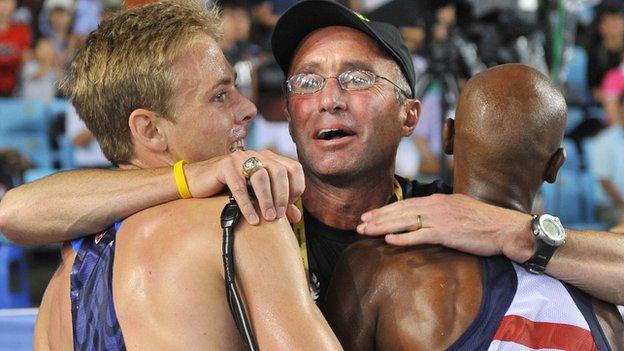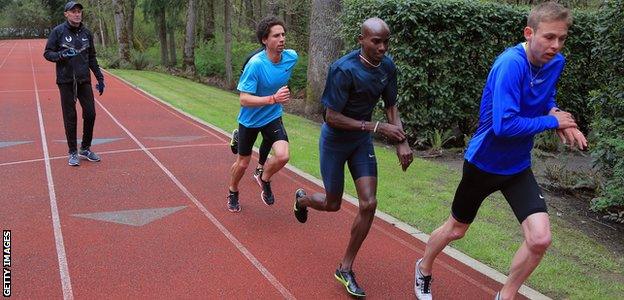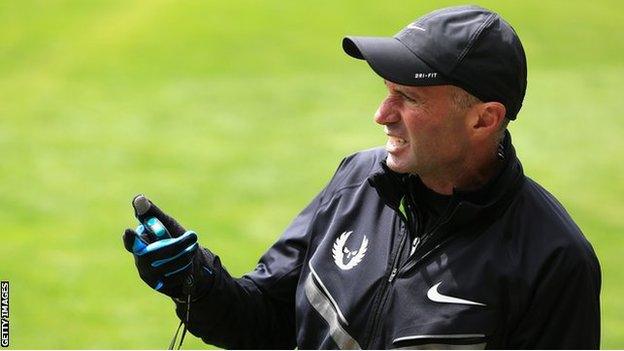Alberto Salazar: Mo Farah's coach 'may have broken rules on testosterone' - report
- Published

Salazar (centre) coaches US athlete Galen Rupp as well as Britain's Olympic champion Mo Farah
Further details of a secret report by doping authorities into Mo Farah's coach Alberto Salazar suggest he broke rules over banned steroid testosterone.
Salazar has been under investigation by the US Anti-Doping Agency (Usada) since a BBC Panorama programme in 2015.
The leaked interim report states the American has thus far failed to provide "acceptable justification for possessing testosterone" at his Nike Oregon Project (NOP) running camp.
Salazar strongly denies breaking rules.
The 58-year-old claims he is being "persecuted".
The Usada report, hacked by the suspected Russian group Fancy Bears and passed to the Sunday Times Insight investigations team, has been seen by the BBC.
According to the report, dating from March 2016, Salazar and several of his athletes have impeded Usada investigators, and "almost certainly" broke anti-doping rules over the infusion of a legal supplement L-carnitine.
Farah breaks European record in his final indoor race
The report also states Salazar risked the health of his athletes, including Farah, by issuing potentially harmful prescription medicines, including thyroid replacement drugs, to boost performance, despite there being no obvious medical need.
But his possession of the banned anabolic steroid testosterone around the NOP athletes he coaches, first revealed by Panorama in June 2015, could also lead to him being banned from the sport. Salazar insists he has a valid prescription for the drug.
The report:
alleges Salazar broke anti-doping rules by failing to establish an "acceptable justification" for possession of testosterone.
states that a testosterone "experiment" conducted in conjunction with Nike doctor Jeffrey Brown to see how much rubbed testosterone gel would trigger a positive dope test was "unlawful".
raises "suspicions and concerns" about Salazar's practice of giving star athlete Galen Rupp personal massages before big races, despite Nike employing massage therapists.
The allegations about Salazar's testosterone use emerged after former NOP coach Steve Magness, athlete Kara Goucher and masseur John Stiner spoke to BBC Panorama. The trio are among dozens who have been interviewed by Usada as part of its ongoing investigation.
Rule 21.2.6 of the World Anti-Doping Agency (Wada) code stipulates that athlete support personnel are strictly prohibited from possessing banned drugs without "valid justification".
Salazar produced a 12,000-word public response, external to the BBC and ProPublica's allegations, including a letter from a specialist stating he required the testosterone for his personal use because he had been diagnosed with hypogonadism, which results in low testosterone.
He also said the testosterone experiment, which used his own sons as "guinea pigs", was designed to protect against his athletes being sabotaged by someone rubbing testosterone gel on them after a race so that they would test positive.
According to the leaked report, five days after the Panorama programme, Usada wrote to Salazar, asking him to provide "all medical records for you referring to [a] condition for which you have been prescribed testosterone".
The report states Salazar's lawyer produced seven documents in support of his condition, but concluded "the documents … do not establish Mr Salazar has suffered from hypogonadism… or that he requires testosterone replacement therapy.
"Despite Usada's request that he do so, Mr Salazar has still produced no laboratory testing records, blood test data, examination notes, chart notes or differential diagnosis substantiating that Mr Salazar suffers from hypogonadism."
The report states "as of March 17, 2016, Mr Salazar's lawyer had still not provided additional documentation to Usada…[and therefore] has not established acceptable justification for possessing testosterone and his admitted possession of testosterone appears to have been a violation of sport anti-doping rules".
The report adds that the concerns listed above are "before even mentioning the Nike Oregon Project document which lists Galen Rupp having received 'testosterone medication' when he was a 16-year-old and being coached by Salazar, as well as Mary Decker Slaney's sanction for an elevated testosterone level while she was being coached by Salazar ."

Salazar's athletes include Britain's Olympic champion Mo Farah and the USA's London 2012 10,000m silver medallist Galen Rupp (right)
Salazar and Rupp, the London 2012 10,000m silver medallist, strongly deny any wrongdoing. In a series of emails in response to BBC questions, Salazar said he would never permit doping at the Oregon Project, and that all the allegations against him were "biased and false".
"I have never rubbed any prohibited substance on Galen or any of my other athletes. These allegations and innuendo against me are malicious nonsense. I have not seen the report and the parts relayed to me are false - demonstrably false and directly refuted by documentary evidence provided to Usada."
He said: "I believe I've done more than any coach to continuously disprove false allegations where no violation has occurred. While I am frustrated that for years now I have had to answer in the media the same, rehashed, false accusations, I take comfort in knowing, that actions speak louder than words.
"The Oregon Project athletes continue to earn success through talent, hard work, dedication and fair play.
"I voluntarily provided Usada with medical records, including blood test results, documenting that I have suffered from a diagnosed disability for more than 20 years. Usada has not requested anything additional since my last response. I find this issue very disturbing, as under US law Usada is required to make a reasonable accommodation for my disability, not persecute me.
"I feel that I am not required to continually, for years and without explanation, share my very personal and private medical records with Usada over a disability that has been diagnosed by multiple doctors for decades. Any insinuation by Usada that I do not suffer from this condition is offensive to me and my treating physicians, and is inexcusable."
The BBC has specifically asked Salazar on three separate occasions in recent days whether he produced any further medical evidence to Usada after 17 March, 2016 the date the leaked report was compiled. He has declined to answer this question.
The leaked Usada report comes after months of speculation the agency's investigation had withered away. Nine months ago, Farah said he felt vindicated after standing by Salazar.
UK Athletics had also given Farah the all clear to keep working with him following its own investigation, saying that it had "no reason to be concerned".
On Thursday, it confirmed it would continue to have a close relationship with Salazar, who remains a consultant to UKA, unless he was charged with a doping offence.
Farah himself, according to the report, remains under investigation over an alleged 2014 infusion of the legal supplement L-carnitine, specifically whether it breached the legal limit of 50ml. He strongly denies breaking any rules.
Farah said last week that Usada should go ahead and publish its findings. It is understood the delay in publishing at least in part is because Usada is looking to the courts to force Dr Jeffrey Brown, the Nike doctor accused of conspiring with Salazar, to hand over his medical records.
Dr Brown, who also denies any wrongdoing, is based in Houston, Texas, and the Texan Medical Board (TMB) is carrying out its own investigation into him.
The TMB did not respond to the BBC's request for comment.
Last week, Usada said: "We understand that the licensing body [TMB] is still deciding its case and as we continue to investigate whether anti-doping rules were broken, no further comment will be made at this time.

Salazar has been under Usada investigation since 2015
"Importantly, all athletes, coaches and others under the jurisdiction of the World Anti-Doping Code are innocent and presumed to have complied with the rules unless and until the established anti-doping process declares otherwise. It is unfair and reckless to state, infer or imply differently."
Salazar has been Farah's coach since 2011, and has masterminded his rise to become Britain's greatest ever distance runner with a haul of four Olympic gold medals.
But questions will persist about his continuing loyalty to a man the doping authorities appear to believe has violated not just the sport's doping code, but its ethical ones too.